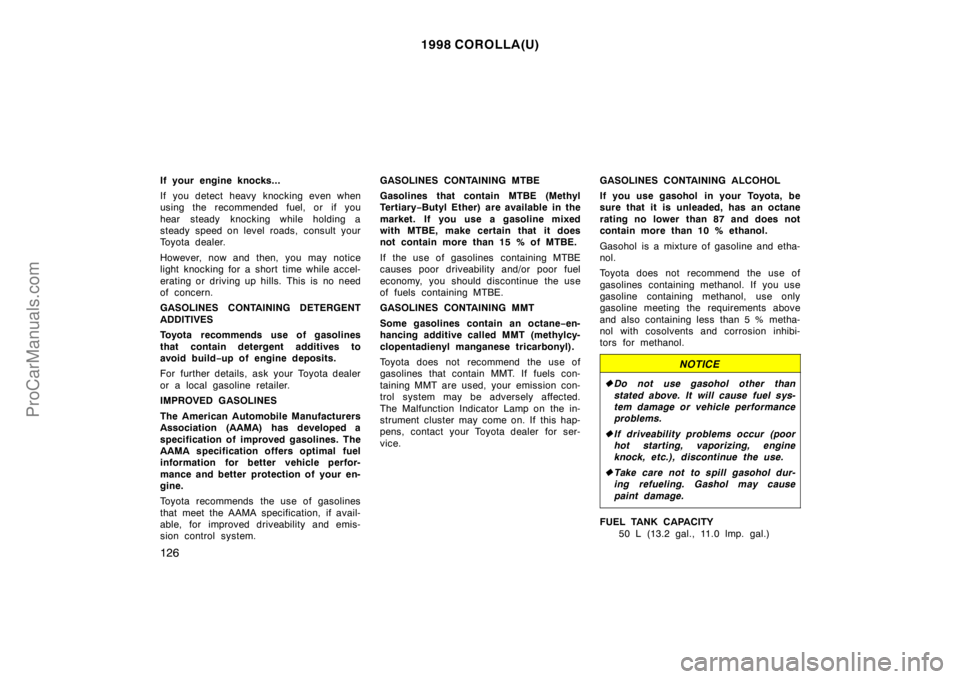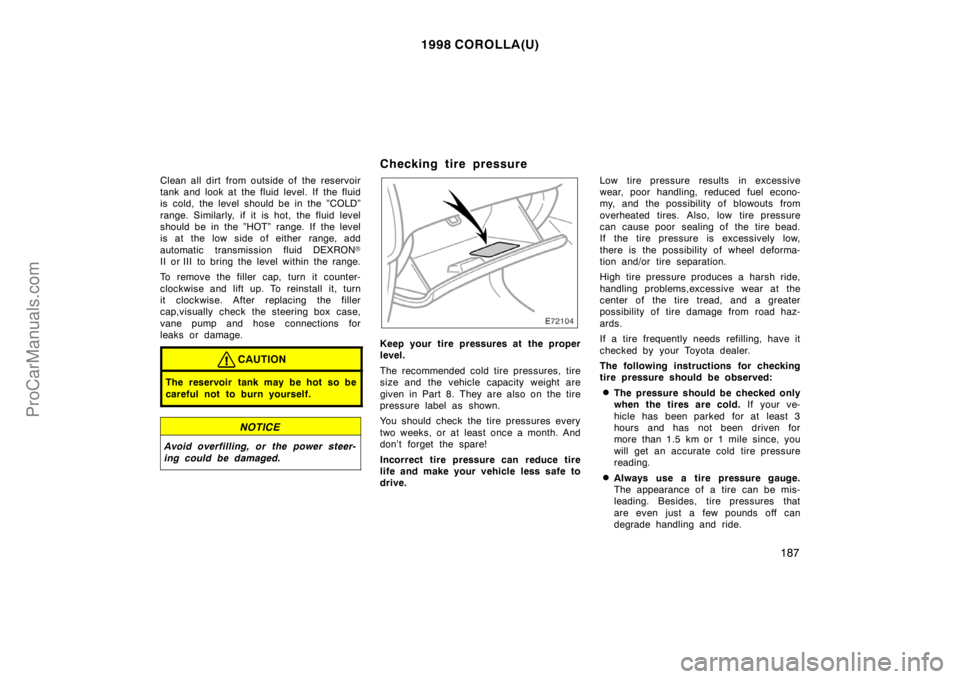Page 118 of 204

1998 COROLLA(U)
126
If your engine knocks...
If you detect heavy knocking even when
using the recommended fuel, or if you
hear steady knocking while holding a
steady speed on level roads, consult your
Toyota dealer.
However, now and then, you may notice
light knocking for a short time while accel-
erating or driving up hills. This is no need
of concern.
GASOLINES CONTAINING DETERGENT
ADDITIVES
Toyota recommends use of gasolines
that contain detergent additives to
avoid build−up of engine deposits.
For further details, ask your Toyota dealer
or a local gasoline retailer.
IMPROVED GASOLINES
The American Automobile Manufacturers
Association (AAMA) has developed a
specification of improved gasolines. The
AAMA specification offers optimal fuel
information for better vehicle perfor-
mance and better protection of your en-
gine.
Toyota recommends the use of gasolines
that meet the AAMA specification, if avail-
able, for improved driveability and emis-
sion control system.GASOLINES CONTAINING MTBE
Gasolines that contain MTBE (Methyl
Tertiary−Butyl Ether) are available in the
market. If you use a gasoline mixed
with MTBE, make certain that it does
not contain more than 15 % of MTBE.
If the use of gasolines containing MTBE
causes poor driveability and/or poor fuel
economy, you should discontinue the use
of fuels containing MTBE.
GASOLINES CONTAINING MMT
Some gasolines contain an octane−en-
hancing additive called MMT (methylcy-
clopentadienyl manganese tricarbonyl).
Toyota does not recommend the use of
gasolines that contain MMT. If fuels con-
taining MMT are used, your emission con-
trol system may be adversely affected.
The Malfunction Indicator Lamp on the in-
strument cluster may come on. If this hap-
pens, contact your Toyota dealer for ser-
vice.GASOLINES CONTAINING ALCOHOL
If you use gasohol in your Toyota, be
sure that it is unleaded, has an octane
rating no lower than 87 and does not
contain more than 10 % ethanol.
Gasohol is a mixture of gasoline and etha-
nol.
Toyota does not recommend the use of
gasolines containing methanol. If you use
gasoline containing methanol, use only
gasoline meeting the requirements above
and also containing less than 5 % metha-
nol with cosolvents and corrosion inhibi-
tors for methanol.
NOTICE
�Do not use gasohol other than
stated above. It will cause fuel sys-
tem damage or vehicle performance
problems.
�If driveability problems occur (poor
hot starting, vaporizing, engine
knock, etc.), discontinue the use.
�Take care not to spill gasohol dur-
ing refueling. Gashol may cause
paint damage.
FUEL TANK CAPACITY
50 L (13.2 gal., 11.0 lmp. gal.)
ProCarManuals.com
Page 179 of 204

1998 COROLLA(U)
187
Clean all dirt from outside of the reservoir
tank and look at the fluid level. If the fluid
is cold, the level should be in the ”COLD”
range. Similarly, if it is hot, the fluid level
should be in the ”HOT” range. If the level
is at the low side of either range, add
automatic transmission fluid DEXRON�
II or III to bring the level within the range.
To remove the filler cap, turn it counter-
clockwise and lift up. To reinstall it, turn
it clockwise. After replacing the filler
cap,visually check the steering box case,
vane pump and hose connections for
leaks or damage.
CAUTION
The reservoir tank may be hot so be
careful not to burn yourself.
NOTICE
Avoid overfilling, or the power steer-
ing could be damaged.
Checking tire pressure
Keep your tire pressures at the proper
level.
The recommended cold tire pressures, tire
size and the vehicle capacity weight are
given in Part 8. They are also on the tire
pressure label as shown.
You should check the tire pressures every
two weeks, or at least once a month. And
don’t forget the spare!
Incorrect tire pressure can reduce tire
life and make your vehicle less safe to
drive.Low tire pressure results in excessive
wear, poor handling, reduced fuel econo-
my, and the possibility of blowouts from
overheated tires. Also, low tire pressure
can cause poor sealing of the tire bead.
If the tire pressure is excessively low,
there is the possibility of wheel deforma-
tion and/or tire separation.
High tire pressure produces a harsh ride,
handling problems,excessive wear at the
center of the tire tread, and a greater
possibility of tire damage from road haz-
ards.
If a tire frequently needs refilling, have it
checked by your Toyota dealer.
The following instructions for checking
tire pressure should be observed:
�The pressure should be checked only
when the tires are cold. If your ve-
hicle has been parked for at least 3
hours and has not been driven for
more than 1.5 km or 1 mile since, you
will get an accurate cold tire pressure
reading.
�Always use a tire pressure gauge.
The appearance of a tire can be mis-
leading. Besides, tire pressures that
are even just a few pounds off can
degrade handling and ride.
ProCarManuals.com
Page 198 of 204
1998 COROLLA(U)
206
Fuel
Fuel type:
Unleaded gasoline, Octane Rating 87 (Re-
search Octane Number 91) or higher
Fuel tank capacity, L (gal., Imp. gal.):
50 (13.2, 11.0)
Service specifications
ENGINE
Valve clearance (engine cold), mm (in.):
Intake 0.15—0.25 (0.006—0.010)
Exhaust 0.25—0.35 (0.010—0.014)
Spark plug type:
DENSO K16TR11
NGK BKR5EKB−11
Spark plug gap, mm(in.):
1.1 (0.043)ENGINE LUBRICATION
Oil capacity (drain and refill), L (qt., Imp.
qt.):
With filter 3.7 (3.9, 3.3)
Without filter 3.5 (3.7, 3.1)
Oil grade:
API grade SH, ”Energy−Conserving II”
or SJ, ”Energy−Conserving” multigrade
engine oil or ILSAC multigrade engine
oil is recommended.
Recommended oil viscosity (SAE):
ProCarManuals.com